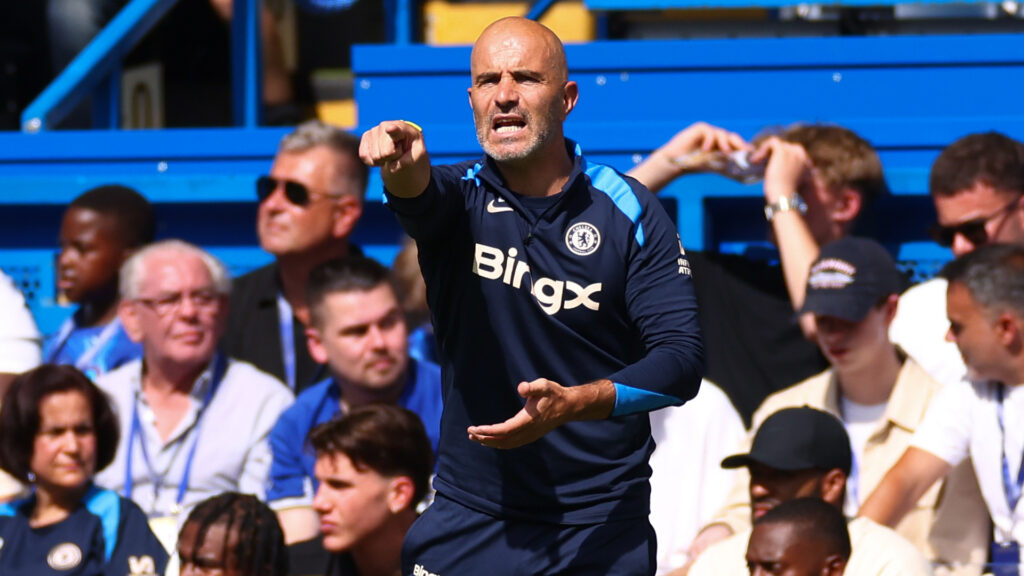The more things change, the more they stay the same. There have been nine arrivals at Chelsea this season and seven departures, a net £75m spent. There’s a new manager and a new kit, and there will shortly be a new sponsor. The churn and turmoil goes on, and yet amid it all, the performances remain reassuringly familiar.
Nicolas Jackson continues to be offside a lot. Cole Palmer continues to look like the one real spark of attacking quality. Marc Cucurella continues to look a player far removed from the left‑back who plays for Spain. The two £100m midfielders continue to look essentially average. Chants for Conor Gallagher, in limbo as his move to Atlético stalls, were the only overt opposition to the club’s transfer policy. Todd Boehly may have trimmed his hair, but he continues to sit in the executive box looking benignly confused.
And of course there was the greatest constant of all in the modern game, the sense of unreality. In many ways this was the perfect way to start the season, a battle of the Premier League’s two most successful sides of the past decade, one of them facing 115 Premier League charges for alleged breaches of the financial fair play regulations – which they deny – and the other subject to a far-reaching investigation of possible offences by their previous owner. If there is an expectation of a transfer ban, it would at least provide some explanation for their market activity this summer.
This is a season that should resolve one case and bring greater clarity as to exactly what the other one entails. Both have the potential to be extremely damaging to the credibility of the Premier League. All of football now feels like one of those passages of play after a possible offside when everybody’s waiting to see if a flag will belatedly go up. Is it real? Does it count? Will any of it matter? Or is it all just ghost football that could be exorcised at any moment?
There were moments when Chelsea threatened to get in behind City, with whom they drew both games last season and the performance wasn’t dreadful, but it was disjointed and there were a remarkable number of individual errors, most significantly as Moisés Caicedo and Enzo Fernández allowed Mateo Kovacic to wander past them before scoring the decisive second.
The sense of chaos was compounded by the omission of Raheem Sterling – or, more accurately, by his camp’s reaction to it as they released a statement appealing for “clarity on the situation”. Sterling, having returned early for individual training, played some part in all six of Chelsea’s pre-season games and evidently expected to be involved, despite the fact they won only one of those games. He was informed on Friday of the “technical decision” to leave him out.
But to an extent this is the problem of having 48 first‑team players. Chelsea had five wide forwards in their match‑day 20: Cole Palmer, Christopher Nkunku, Mykhailo Mudryk, Noni Madueke and Pedro Neto would presumably have been just as disappointed to be overlooked.
For the second season running Chelsea began the season without a main shirt sponsor, having failed to find anybody willing to pay the reported £60m asking price. A short-term deal is expected to be announced soon, but for now everybody gets to enjoy, unadulterated, the swirling blue pattern of the kit. It has the feel of a British Gas advert of about a decade ago, but apparently represents the hottest part of a flame and thus the “passion, drive and determination” of the club, while also featuring a “melting pot pattern” that symbolises “the fusion of Chelsea’s rich legacy with the dynamic culture of London”.
Speaking of which, Fernández was named as captain a month after sharing a video showing him and various Argentina teammates singing racist songs. While it’s possible to sympathise with Chelsea in that the offence didn’t happen on their watch, it is their mess to clear up. Having him offer an apology and make a contribution to an anti-racism charity looks a less than stringent sanction and their insistence the matter is closed feels both optimistic and uncomfortably expedient.
That dynamic culture costs fans an average 5% more to be part of this season and does not stretch to allowing children to take photographs on their phones of the post-match interviews or to have the geography and lore of the ground explained to them by accompanying adults; stewards were notably quick to chase away those who lingered, explaining: “If we allow that, we’ll be here all day.”
Fans who are treated as an inconvenience, academy products flogged off to make an accounting trick work, a squad so big they need a network of clubs just to accommodate them. Clearlake and Boehly promised to be disruptive; the result appears a broken club in desperate search for a soul.








More Stories
Amorim insists Fernandes not leaving Manchester United amid Madrid reports
How debt burden pushed Nigerian boxer Segun Olanrewaju to a fight that took his life
Nigeria Taekwondo Federation boss, Abdullahi Saidu dies at 53